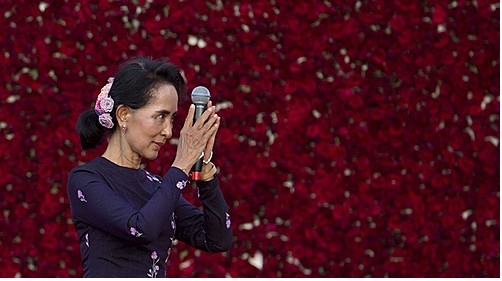
[Special Economy=Eunji Kim]The results of Myanmar's historic parliamentary elections have been released, with Aung San Suu Kyi's National League for Democracy taking a majority of 80% of the seats, and experts are now looking at how its aftermath will affect Korean businesses--good or bad.
On one hand, its newly-founded democratic values can strengthen the free market, but on another, its yet unstable political change can bring disorder to Korean companies.
With that in mind, where the situation currently lies with Korean firms in Myanmar is brought to light.
The country that was once called Burma undertook various reform movements in 2011 and led the establishment of 200 Korean businesses in its homeland. And, sewing-industry based manufacturing firms helped develop Mynamar's insufficient infrastructure. This hand-in-hand cooperation was later called "Korea's 1970s land of opportunity," referred to a time when Korea experienced significant economic boom and development.
Korean firms that have been set up in Myanmar are: Myanstar Garment Co., fast-food chain Lotteria, restaurant Yoogane, make-up company, Holika, among others.
Looking at another Korean company that sells life necessities, Lock & Lock, it opened its first franchise in 2012 at Myanmar's largest city, Yangon, and founded four more stores as of now. It will further expand to two extra shops by December and have a total of six businesses under its belt; As a result, Myanmar's exports has increased 60% from 2012.
Moreover, CJ Korea Express Corporation, that specializes in transportation, has said it will bring in 60 freight cars from Korea, increase investment deals and expand its business to other areas in Myanmar.
Roadblocks for Korean companies in Myanmar
But, the problem is that it's difficult to set up production factories in Myanmar.
Samsung, LG, Hyundai Motors have been established here, but its production facilities are weak.
There's also the issue of rent. Currently, only particular cities have been developed in Myanmar and because of this, the rent is high like that of an expensive area in Korea, Myeong-dong. And, so comes the economic burden for these Korean companies.
Thirdly, the transportation infrastructure in the country is lacking, and fourthly, wages have soared three to four times in one year. If money supply decreases by providing for the wages, a company's liquidity can fall, too.
Because Myanmar has protection policies over its domestic firms, it's hard for Korean businesses to enter the domestic market through exports.
Legally, the country is preventing foreign companies from establishing export franchises. So, Korea has to opt to buy raw materials from Myanmar, then manufacture back home, and finally export to Myanmar--a complicated process.
There's even a matter that if an export company is instituted, the law is that management has to fall in a Myanmar native's hands--another burden.
And, if the political conflict between the military junta and NLD continues, that can have a bearish factor on the economic situation for Korean businesses in Myanmar.
Experts say, taking all these considerations into play, Korean firms should think and prepare carefully about going into Myanmar.

